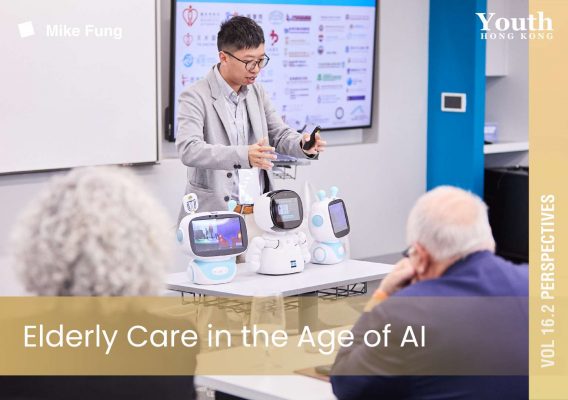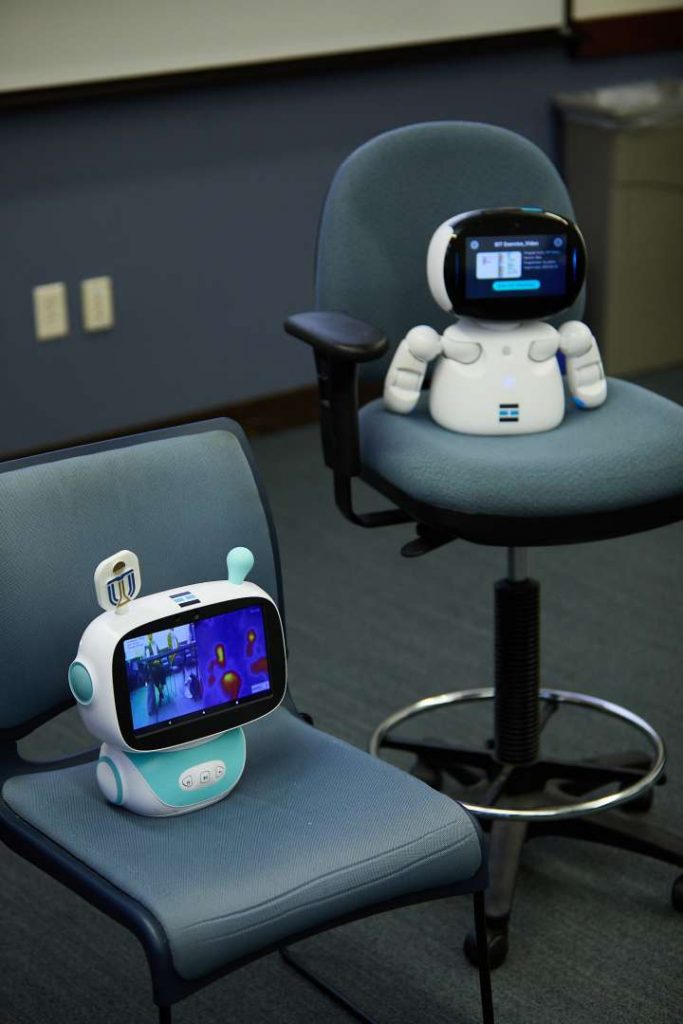//16.2 Perspectives: Healthcare
Future Robotic Carers
by Mike Fung
Hong Kong faces significant challenges with its rapidly ageing population, but leveraging AI and technological innovations in healthcare has the potential to greatly enhance elderly care.
Hong Kong is grappling with one of the fastest-ageing populations in the world. As of 2020, about 18% of the population was aged 65 or above, and the figure is projected to surge to around 30% by 2040. This demographic shift places immense pressure on the public healthcare system, leading to long waiting times, a shortage of healthcare professionals, and escalating costs in rehabilitation and long-term care.
The shortage of manpower is expected to worsen as Hong Kong population continues to age, exacerbating the existing strain on healthcare services. Additionally, there is a dire shortage of residential care homes, nursing homes, and long-term care facilities. Many elderly individuals face waiting periods of several years for these services, resulting in a reliance on family caregivers and community support, which adds further strain to these resources.
Despite these challenges, Hong Kong can leverage technological advancements to enhance healthcare accessibility and efficiency for the elderly. Telemedicine, remote monitoring, and AI-driven diagnostics can help improve elderly healthcare by providing more efficient and effective care, while also reducing the burden on the public healthcare system.
The development of community-based healthcare services presents another opportunity for improvement. By providing healthcare services within local communities, elderly individuals can access care more easily and conveniently. Hong Kong can further promote the “community care” model and invest in home-based and community-based services to enable the elderly to age in place and receive care within their familiar environments.
Innovative Healthcare Solutions
In 2020, we launched a healthcare project providing innovative healthcare solutions, with cloud computing, thermal sensing and remote photoplethysmography technology. Spearheaded by Professor Mow Wai-ho, the Associate Dean of Engineering at The Hong Kong University of Science and Technology, the project developed the first-generation self-monitoring station to perform temperature checking in public spaces. To protect the community in Hong Kong during COVID, we sold many thermal systems to hospitals, elderly centres and schools at a reasonable price. During our visit to those elderly centres, we found many elderlies were unhappy and even struggled with mental health issues, because they were isolated for months due to social distancing and disconnection from their family members.
Driven by a vision to contribute to a physically and mentally healthy society, our team expanded their research and development efforts. We introduced smart companion robots, “XiaoBo” and “FitBo,” designed to enhance elderly healthcare. These robots offer features such as news updates, exercise routines, entertainment, and video conferencing with family members. The organisation and their families can also schedule some daily activities and update the ChatGPT-integrated chatbot for the elderly, providing customisations to fit individual needs.
An advanced feature integrated with the remote photoplethysmography and thermal-based health monitoring system can detect the user’s facial expression. Through our technology, robots can detect vital sign information, including the heart rate and breathing rate, when they interact with elderlies and collect health data simultaneously. The continuous monitoring of vital sign information helps to understand the health status of the elderly and provides warning to their caregivers about abnormal status.
The Future of Elderly Healthcare
The rapid advancement of AI technologies is poised to bring significant changes to the future of elderly healthcare.
AI-powered remote monitoring systems and wearable devices can track elderlies’ vital signs and health metrics in real time, alerting caregivers of potential health issues. The continuous monitoring can help prevent complications and enable timely interventions and improving overall health. Besides, AI can help healthcare professionals develop personalised healthcare plans for the elderly based on their unique medical history and lifestyle factors. This tailored approach can lead to more effective treatments with fewer side effects, ultimately enhancing elderlies’ well-being. The robotic caregivers, smart home systems, and virtual assistants, can provide support for daily living activities, enhancing the independence and quality of life for elderly individuals.
However, the fast growth of AI in healthcare also raises concerns about data privacy and security, the collection and storage of sensitive medical information can make it vulnerable to unauthorised access and misuse. The adoption of new technologies is relatively slow in Hong Kong, and there are concerns about digital literacy and inclusivity among the elderly population. Besides, AI-driven healthcare decisions may raise ethical concerns, particularly when it comes to resource allocation. Ensuring that AI systems make unbiased and transparent decisions is crucial to maintaining trust in the technology.
In conclusion, Hong Kong faces a significant challenge with its ageing population. The rapid advancement of AI technologies holds the promise of improving the quality of elderly healthcare through personalised treatment, enhanced health monitoring, and increased accessibility. However, it is essential to address the potential negative impacts, including privacy concerns and ethical considerations, to fully realise the benefits of these technological advancements. ■
Mike Fung Kwong-chiu is the project manager of Intelligent Design Technology Limited and a participant in the Federation’s flagship leadership programme “Hong Kong 200.” Passionate about social innovation, healthcare, assistive technology, and AI, he is committed to making the city a better place to live.




